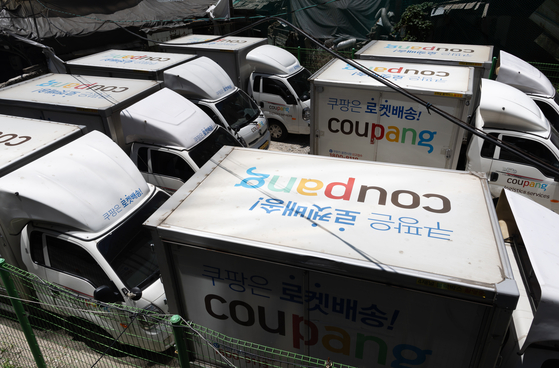![A Coupang delivery truck is parked in Seoul on Thursday after the Korea Fair Trade Commission announced its decision to impose a 140 billion won fine on e-commerce giant Coupang for allegedly manipulating search results. [YONHAP]](https://koreajoongangdaily.joins.com/data/photo/2024/06/14/f9de54f2-75c0-46fa-b5a5-ecef8ce71703.jpg)
A Coupang delivery truck is parked in Seoul on Thursday after the Korea Fair Trade Commission announced its decision to impose a 140 billion won fine on e-commerce giant Coupang for allegedly manipulating search results. [YONHAP]
[NEWS IN FOCUS]
Antitrust regulators' decision to fine Coupang 140 billion won ($102 million) for alleged search manipulation could lead to a major restructuring of the New York-listed e-commerce platform's business operations and delivery services, as well as have ripple effects for South Korean retailers that use similar tactics.
The penalty takes aim at the practice of online retailers placing their own products prominently at the top of search results on major e-commerce platforms such as Market Kurly and SSG.com, where their own private label tissues and food products often appear at the top of search results.
The Korea Fair Trade Commission has accused Coupang of manipulating search algorithms to favour so-called private brand (PB) products.
But some industry insiders believe the practice should not be considered illegal, likening it to the strategy of displaying certain products in prominent locations in brick-and-mortar stores and supermarkets.
“The decision is outdated and out of touch with the reality of platform commerce,” said Kim Min-chen, a spokesman for the Korea Internet Companies Association, which represents South Korean tech companies.
“If they are going to implement such policies, they should do the same for foreign e-commerce merchants like AliExpress and Temu,” he said, adding that the fine amount was “excessive.”
The 140 billion won fine is the largest ever imposed on a South Korean retailer.
Following the Fair Trade Commission's (FTC) decision announced on Thursday, Coupang said it will no longer be able to recommend products registered on the Rocket Delivery system and that if sales fall, it may not be able to maintain its current same-day Rocket Delivery service.
Approximately 90% of Coupang's sales come from direct purchase transactions, such as contracts with manufacturers to store products in its own storage centers. These products make up the majority of the goods shipped through Coupang's Rocket Delivery service, which also delivers private label products.
The e-commerce giant immediately canceled a groundbreaking ceremony for the construction of its Busan fulfillment center, which had been scheduled for June 20, the Friday following the FTC's announcement.
A company spokesman said it had not been confirmed whether construction of planned distribution centers in Icheon, Gyeonggi Province, and Gimcheon, North Gyeongsang Province, would proceed as planned.
The centers were part of Coupang's 3 trillion won investment to build distribution centers across the country, with the company promising to guarantee free delivery wherever it is.
Coupang said in a statement on Thursday that it may also cancel an investment of 3 trillion won in logistics, on top of the 22 trillion won it had pledged to make Korean brands more competitive amid intensifying competition from Chinese suppliers.
A retail industry insider said, “Coupang is feeling a sense of crisis as its core business is faltering,” adding, “There are concerns that this will have an impact on Rocket Delivery's sales, so it appears to have decided that there is no reason to continue investing.”
In response, the FTC said in a statement on Friday that it “does not intend to ban or regulate Coupang's Rocket Delivery System or endorse any conventional products.”
“The move was made in response to Coupang's manipulation of search result algorithms and its employees writing reviews and giving high ratings. [to its products]. ”
“Coupang is able to continue promoting Rocket Delivery Service's products through search engine ads, banner ads, and filters in search results without using deceptive tactics,” the FTC said.
The FTC also plans to refer the e-commerce giant and its subsidiary, Coupang Private Label Brands (CPLB), for prosecution.
Park Eun-ji, Kim Joo-young [park.eunjee@joongang.co.kr]


